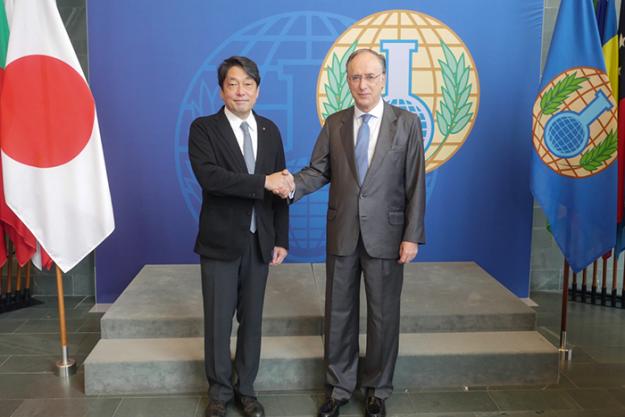
The Director-General of the Organisation for the Prohibition of Chemical Weapons (OPCW), Ambassador Fernando Arias, and the Minister of Defence of Japan, Mr Itsunori Onodera
THE HAGUE, Netherlands — 4 September 2018 — The Director-General of the Organisation for the Prohibition of Chemical Weapons (OPCW), Ambassador Fernando Arias, and the Minister of Defence of Japan, Mr Itsunori Onodera, met today at the OPCW Headquarters in The Hague.
The Director-General briefed the Defence Minister on the progress of the implementation of the Chemical Weapons Convention, OPCW’s continuing activities in Syria, as well as current and future priorities and challenges of the Organisation such as achieving universality of the Convention, upgrading the OPCW Laboratory, and intensifying international cooperation and assistance.
The Director-General commended Japan’s active role in global chemical disarmament including the steady progress in destroying chemical weapons abandoned by Japan on the territory of China. He also expressed appreciation for Japan’s generous contributions to the OPCW’s Syria Trust Fund and a range of other activities.
Ambassador Arias stated, “I look forward to working with Japan and other OPCW Member States to fulfil the Chemical Weapons Convention’s ultimate goal of a world permanently free of chemical weapons”.
Minister Onodera recognised the importance of the OPCW’s activities for a world both free of chemical weapons and of the threat of their use, and also expressed his intention to actively cooperate with OPCW including reinforcement of its capabilities.
The Defence Minister was accompanied by Japan’s Permanent Representative to the OPCW, H.E. Mr Hiroshi Inomata, and other members of the delegation.
Background
Japan joined the Chemical Weapons Convention in 1997 and is a current member of the OPCW Executive Council.
As the implementing body for the Chemical Weapons Convention, the OPCW, with its 193 Member States, oversees the global endeavour to permanently eliminate chemical weapons. Since the Convention’s entry into force in 1997, it is the most successful disarmament treaty eliminating an entire class of weapons of mass destruction.
Over 96% of all chemical weapon stockpiles declared by possessor States have been destroyed under OPCW verification. For its extensive efforts in eliminating chemical weapons, the OPCW received the 2013 Nobel Peace Prize.
More Information
